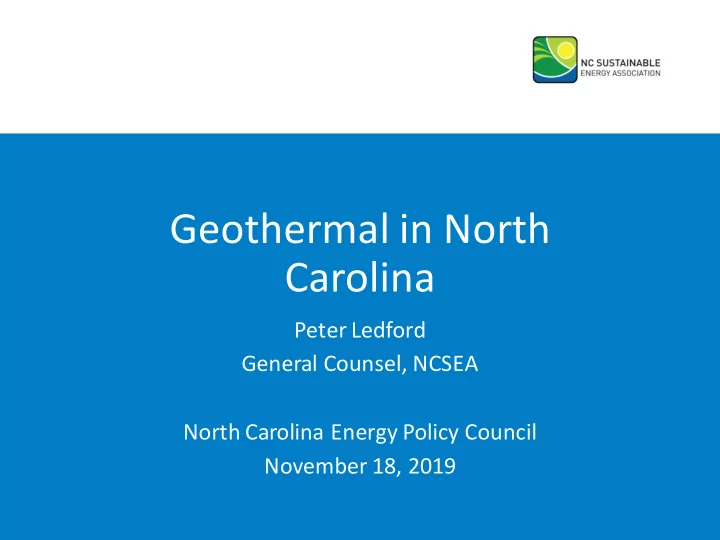

Geothermal in North Carolina Peter Ledford General Counsel, NCSEA North Carolina Energy Policy Council November 18, 2019
What is NCSEA? Our Mission Drive policy and market development to create clean energy jobs, economic opportunities and affordable energy to benefit all of North Carolina. The NC Sustainable Energy Association is a 501(c)(3) nonprofit membership organization of consumers, businesses, government, utilities and nonprofits interested in North Carolina's sustainable energy future. 2
What is Geothermal? • Includes both Geothermal Energy and Ground Source Heat Pump (GSHP) technologies: • Geothermal energy technologies utilize the thermal energy stored in the Earth to generate electricity • GSHPs are central heating and cooling systems that increase efficiency by transferring heat to or from the ground 3
Geothermal Energy Potential 4
Earth Sub-Surface Temperature 5
What is a GSHP? 6
What is a GSHP? • 2 main types: • Open loop • Closed loop • 2 main subcategories: • Vertical • Horizontal 7
What is a GSHP? Closed Horizontal Loop 8
What is a GSHP? Open Loop Well Water 9
What is a GSHP? Closed Vertical Loop 10
What is a GSHP? Lake or Pond System 11
How Efficient is a GSHP? • According to the International Ground Source Heat Pump Association, GSHPs are: • 50-70% more efficient than comparable heating systems • 20-40% more efficient than comparable cooling systems 12
How is a GSHP Installed? 13
How is a GSHP Installed? 14
How is a GSHP Installed? 15
What are the Costs Associated with Installing a GSHP? Development of a Multi-Objective Sizing Method for Borehole Heat Exchangers during the Early Design Phase, 2017 16
How Much is an Average GSHP? • Residential: • $2,500/ton for the system itself • 5-10 year payback Guide to Geothermal Heat Pumps, 2011 17
How Does a GSHP Compare to Traditional HVAC Systems? Geothermal Heat Pumps in K-12 Schools: A Case Study of the Lincoln, Nebraska, Schools (Shonder, Martin, and Hughes; 2000) 18
GSHPs in NC • From 2007-2018, over $30 million has been invested in Geothermal systems in the state • 0.2% of direct spending in clean energy development by technology • Over 7,600 geothermal systems were installed in NC from 2007-2018 • 49.8% of renewable energy systems installed over that period 19
GSHPs in NC Ground Source Heat Pumps Installed in NC 9,000 8,000 7,000 Cumulative Installations 6,000 5,000 4,000 3,000 2,000 1,000 0 2013 2014 2015 2016 2017 Year 20
GSHPs in NC 21
Geothermal Industry in NC • According to NCSEA’s 2018 Clean Energy Industry Census: • 225 companies active in the sector (7% of the clean energy industry) • 1,075 jobs (4%) • $252 million in revenue (2%) 22
Geothermal Industry in NC Business Activities spondents 40% stion Resp 33% 35% 30% Percent of Quest 25% 21% 20% 17% 15% 10% 10% 10% 10% 5% 0% Installer and Sub-contractor Designer of Manufacturer Well-driller Other deve veloper of and/or loop ground source and distributor of ground source installer heat pump ground source heat pump systems heat pump systems systems 23
Geothermal Industry in NC Custome mer r Base Respondents 35% 30% Question Re 30% Percent of Qu 25% 18% 20% 17% 14% 15% 10% 10% 6% 5% 5% 5% 0% 0% Residential al Residential al Comm mmercial Comm mmercial Industrial Military Other single fam amily multi-fam amily < 4,000 ft2 > 4,000 ft2 and/or an Comm mmercial 24
Geothermal Industry in NC Geothe herma rmal System m Type pe Respondents 35% 28.47% 30% Question Re 23.36% 25% 21.17% Percent of Qu 20% 16.06% 15% 10% 7.30% 3.65% 5% 0% Open loop heat Vertical al closed Horizontal La Lake loops Comm mmercial Other pump mp systems loop heat at closed loop an and/or pond water source ce pump mp systems heat pump mp loops heat pump mp systems ms 25
What Contributed to Growth of GSHPs in NC? • NC’s 35% renewable energy tax credit that expired at the end of 2015 and the federal residential renewable energy 30% tax credit that expired at the end of 2016 • The federal tax credit was brought back at 30% in 2018, with step downs eventually to 22% in 2022, but has no maximum value limit 26
Thank You Peter Ledford General Counsel peter@energync.org (919) 832-7601 x107 27
Recommend
More recommend